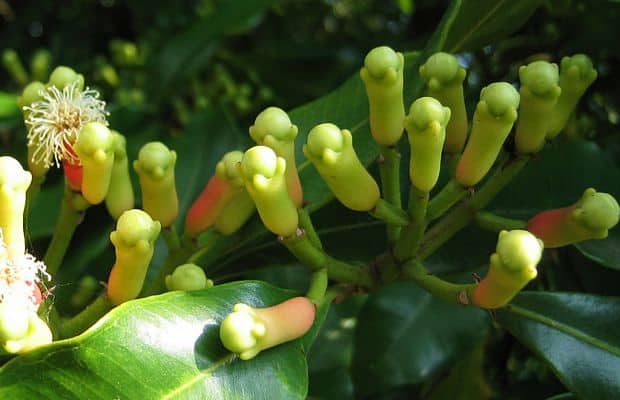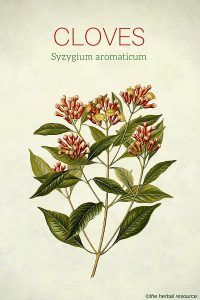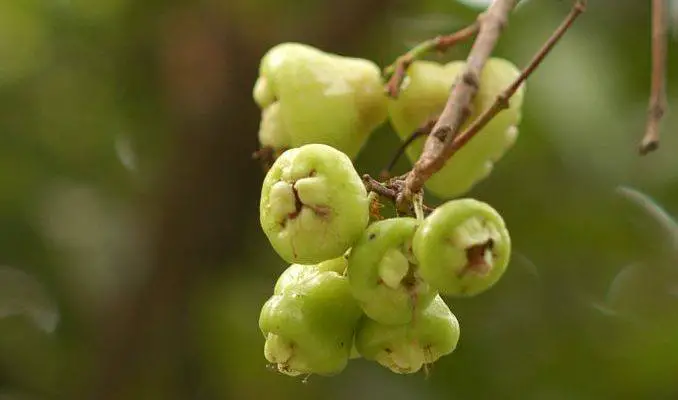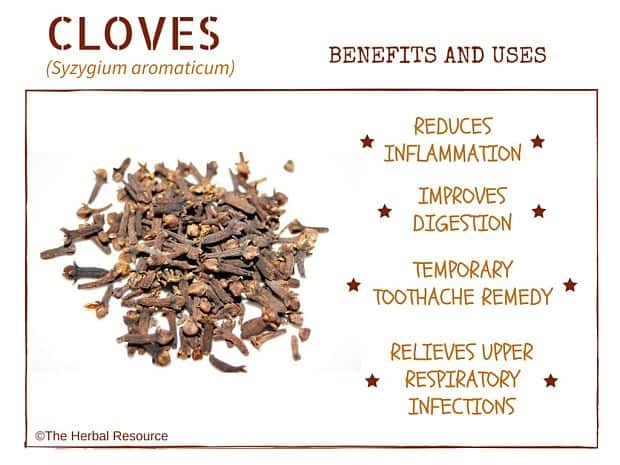Botanical Name: Syzygium aromaticum.
Other Common Names: Mother cloves, clovetree, Gewürznelken (German), lavanga (Sanskrit), Kryddernellike (Danish), clous de girofle (French), clavo (Spanish), chouji (Japanese), lang (Hindi).
The English common name “cloves” derives from the Latin word Clavus, which means nail.
Habitat: It is believed that the clove-tree is originally native to the Maluku Islands or the Moluccas, an Indonesian archipelago and from there it has spread to other parts of the globe with suitable climate.
Today, it is commercially cultivated in many tropical countries.
Description: Clovetree is an evergreen tree that belongs to the myrtle family (Myrtaceae). It can reach up to 12 to 15 meters in height.
It has a pyramid-shaped crown with hanging branches, and shiny green, ovate and opposite aromatic leaves.
The flowers sit in terminal clusters on the tips of the branches. The flowers are bell-shaped and have red cups and white crowns. The fruit is a small berry that contains one or two seeds.
Plant Parts Used: The dried immature flower buds are mostly used as a spice but also as an herbal medicine.
The flower buds are collected before they turn red from trees that are least 10 years old and then sun-dried for 4-5 days. Each tree can produce around 4 or 5 kilos of clove every year.
When the flower buds are fully dried they will turn dark brown and very hard so to make use of them as a seasoning or medicine they must be ground into powder.
Whole cloves can be kept for several years if they are stored in an airtight container. In powder form, they lose their flavor relatively quickly.
An essential oil is obtained from the leaves, stems and flower buds of the clove-tree by steam distillation. The clove oil is a pale yellow liquid with a strong and spicy aroma.
The oil with the highest quality and the one that should be used in herbal medicine is obtained from the flower buds as the ones obtained from the leaves and stems are rather toxic.
Therapeutic Uses, Benefits and Claims of Cloves
Active Ingredient and Substances
Cloves contain 12-26% oil, with eugenol (70-90%) and beta-caryophyllene (as high as 7%) as the main constituents. Other ingredients found in the oil are furfural, methyl salicylate and alpha-pinene.
The composition of the essential oil can vary depending on the quality and origin of the clove tree. Eugenol inhibits prostaglandin and explains the analgesic and anti-inflammatory properties of cloves.
Cloves also contain rubber, mucins, tannins, vitamins and minerals.
Cloves Uses in the Past and History
The oldest recorded medical use of cloves, as early as 240 BC, comes from China, where it was used as a remedy for many different ailments, including diarrhea and hernia.
The Chinese nobility used it against bad breath and it was common to have cloves placed in the mouth when in audiences with the Emperor.
The clove was first introduced to Europe a few centuries after Christ’s birth and was then regarded as a luxury spice. Merchants from the Middle East who brought it with them kept the country of origin secret to keep the prices up.
It was only centuries later during the Middle Ages that the Portuguese gained monopoly when they discovered and occupied the Moluccas.
In 1605 the Dutch gained control of the island Amboina, one of the islands belonging to the Moluccas and took over the clove export and agricultural business. In order to maintain complete control of all the export, they ordered that all clove-trees should be destroyed on the remaining islands.
It was first in the 1770s that the French succeeded to smuggle seeds and seedlings out of the Moluccas to Mauritius. From there, the plant spread further to Reunion and French Guiana and from there to Zanzibar and Madagascar.
Today, Indonesia and Madagascar are the largest producers of cloves in the world.
Culinary Uses of Cloves
Clover have a unique flavor which can be best described as is fruity, crisp and rather bitter. The distinctive flavor is mainly because of the eugenol content found in the essential oil.
In Europe and the US, large amounts of cloves are used in the food industry, especially in the preparation of various sauces, seasoning mixes, ketchup making, as well as in liquor production.
Cloves should be used sparingly in cooking since they can easily overpower the flavor of other spices.
Cloves are used to add flavor to various curry dishes, in baking, desserts, soups, sauces, syrups, and jams.
The custom of placing cloves in oranges to make pomander, a custom especially popular around and during Christmas, can be traced back to 16th century.
More than half of the world production of cloves goes to the tobacco industry, where it is used as a flavoring in cigarettes. In Indonesia, special clove cigarettes know as “kratek” are very popular.
Cloves as Herbal Medicine
Very little scientific evidence exists that confirm the many health claims associated with cloves but the herb does have a long history of traditional use as a medicine for various ailments.
It has been used traditionally to prevent nausea, for bad digestion, enhance blood circulation, to relieve hiccups and enhance liver function.
One of its uses in folk medicine was to put two whole cloves in the mouth, without chewing or swallowing, to help to suppress the desire for alcohol.
The clove has antiseptic properties and has been used as a remedy for ailments associated with the respiratory system, infections of the digestive system and urinary tract infections.
It is considered to be useful for infections of both bacterial and viral nature.
One of the few scientific studies done on the herb showed that the essential oil is effective against bacteria such as Streptococcus, Staphylococcus, and Pneumococcus.
Cloves are considered to have a slight antihistamine effect. A tea made from cloves has been used to treat hay fever, nasal congestion and sinus pressure.
Clove tea is also thought to be good for the nervous system and is sometimes used to lessen tension, anxiety, and depression.
Cloves are believed to beneficial for the digestive system by reducing cramps, remove flatulence and increase the absorption of nutrients. In addition, the astringent properties of the tannins present in the herb might be quite useful for diarrhea.
Cloves have a slight skin numbing effect and are sometimes used for topical pain relief. This numbing effect might also be helpful in preventing premature ejaculation, though no studies are available to confirm the effectiveness of this use.
Cloves Essential Oil
In aromatherapy, the clove essential oil is considered to be both warming and stimulating. When clove oil is applied directly to the skin, it must be heavily diluted in order to avoid skin irritation. The oil has also antineuralgic and analgesic properties that might make it beneficial in the treatment of rheumatism and arthritis.
The clove oil has been used for a long time as a treatment for a toothache due to its anesthetic properties. As a toothache home remedy, cotton balls or swabs can be dipped in the oil and placed directly on the affected tooth.
The oil is often diluted with alcohol and used as a treatment for aching muscles and arthritis. Additionally, it can be useful as a disinfectant when applied to cuts and wounds and to remedy ringworm and athlete’s foot.
Clove oil is also be used for the artificial production of vanillin, the substance that gives the flavor of vanilla.
Dosage and Administration
When cloves are intended as herbal medicine it is usually as a commercially made supplement either in a pill or capsule form but can also be found as a tincture and an essential oil.
The manufacturer’s instructions regarding dosage should always be followed.
Potential Side Effects of Cloves
Cloves are not considered harmful or have any serious side effects when used as seasoning. The essential oil is very strong and should be used with caution and never in its undiluted form or internally.
In any oil blends intended for therapeutic reasons the clove essential oil should not be present in higher concentrations than 1%, or it may cause skin irritation.
It is probably safest to avoid using the essential oil during pregnancy and lactation, and the oil should never be used on infants.
Other Resources on Cloves
Supporting References
Elkins, Rita: Medicinal Herbs of the Rain Forest. Pleasant Grove, Woodland Publishing 1997.
Lawless, Julia: The Illustrated Encyclopedia of Essential Oils. Shaftesbury, Element Books 1995.
Rätsch, Christian: Plants of Love. Aphrodisiacs in History and a Guide to Their Identification. Berkeley, Ten Speed Press 1997.
van Wyk, Ben-Erik & Michael Wink: Medicinal Plants of the World. Portland, Oregon, Timber Press 2004.
Thordur Sturluson
Latest posts by Thordur Sturluson (see all)
- What is the Difference Between Hemp and Marijuana? - June 3, 2019




Having an earache not diagnosed as otitis, I began drinking coffee to which I added cloves. It seems to provide relief and act as a good complement to ear drops prescribed by my GP in France.(phenazone, lidocaine chlorhydrate) . Incidentally, I also noticed that cloves in coffee cut down on the bitterness.
This is only an observation. Cc